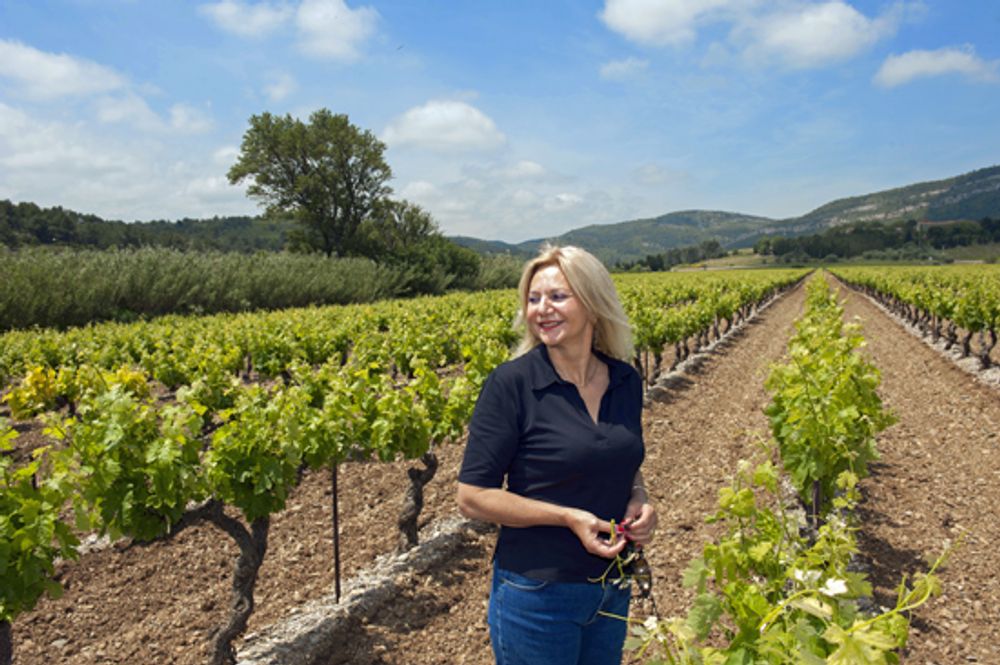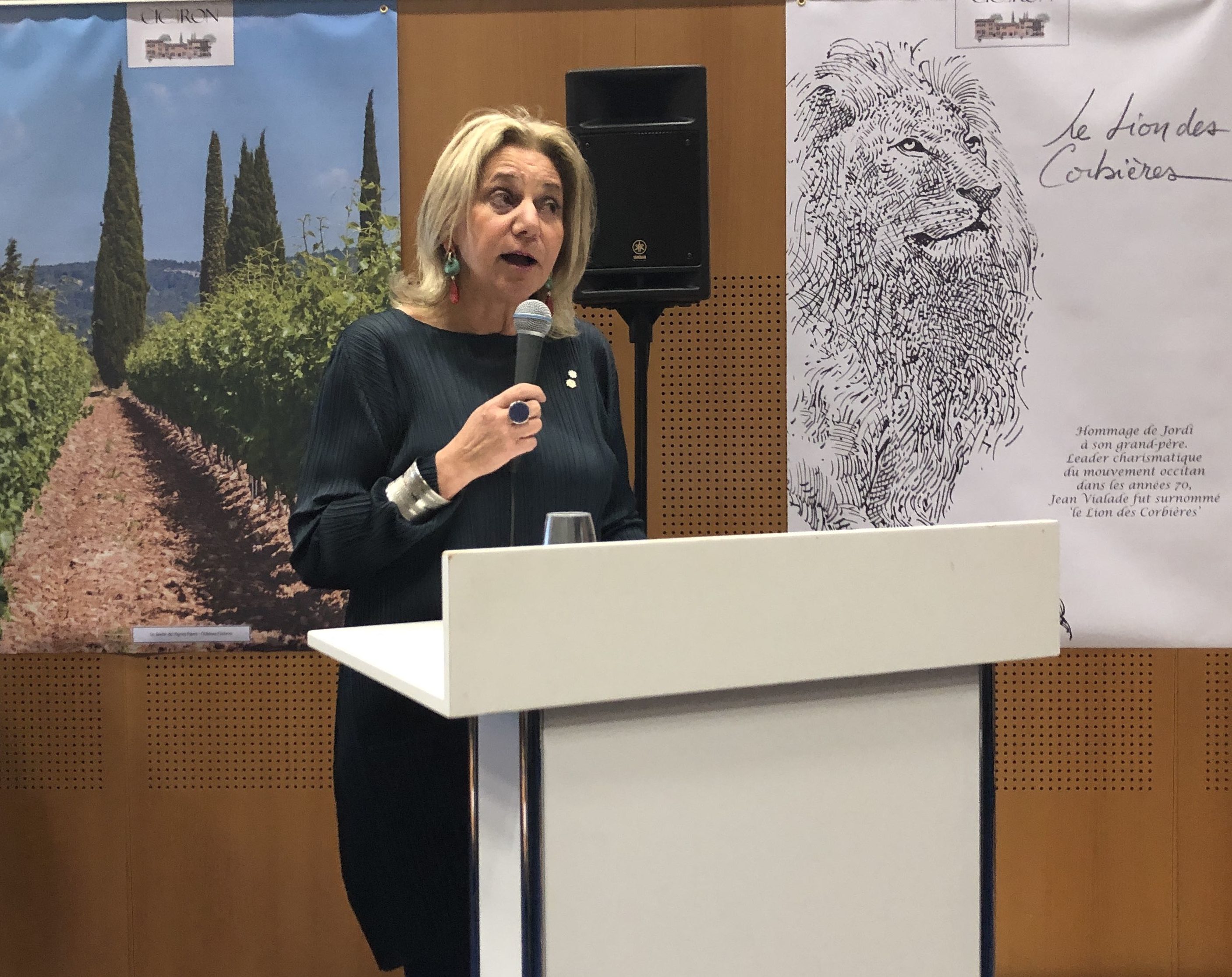Claude Vialade is passionate about making wine in the right way, which, for her, means organic viticulture at Domaine Auriol
Tell us about your own career in wine and background?
As a young girl, I would accompany my father in the vineyards and cellars of the château where he was estate manager. I was fascinated by the winemaking process and used to be told off for dipping my hand in the fermenting vats. After completing a business degree, I joined the Val d’Orbieu co-operative group and eventually became export director. I left after 10 years to become director of the AOC Corbières syndicate, where I worked on wine tourism initiatives, terroir/production area policy, and communication.
Why did you decide to set up your own business, Domaines Auriol in 2000?
By then I had over 20 years’ professional experience and I felt I had made as much difference as I could working for others. It was high time for me to start my own business, focus on the family estates and put my values in practice: building a better and cleaner future for the next generations.

Claude Vialade is going the extra mile to promote organics
Why the Languedoc? Is it hard to stand out against so much competition there?
I grew up in the Languedoc. My family and my roots are there and there is no way I could live or work anywhere else. Also the Languedoc Roussillon, thanks to its climate, is the largest French region for organic wines with over 10% of the total vineyards surface. Organic winegrowing is the way forward and is at the centre of what we do and believe in.
What is your biggest achievements in wine to date?
I am delighted by the success of our organic conversion initiative, which will double the volume of organic wines Domaines Auriol will bring to market in three years’ time.’
What have been the hardest challenges?
Starting my career in the co-operative world was tough. Later on, the main challenge has been to implement change, be it within the company or in the vineyards, for example convincing winegrowers to plant the right varietals, to improve their winemaking techniques or to adapt to the market.
Can you talk through the idea to convert the estate to organic farming. Why have you decided to do that and how hard has it been?
My father, Jean Vialade, nicknamed the Corbières lion, was famed in his day for his political activism and passionate commitment to the green cause. He created the first organic village at Ribeaute in 1973. Our family estates couldn’t be anything but organic. These are our family values and they’re not negotiable.
What have been the key stages in the process?

Our own organic conversion process is long in the past, but I was aware of the complexity and cost of the process for new converts. This is why I launched a new initiative in autumn 2018. Estate owners interested in converting to organic standards stand to receive a substantial financial support from Domaines Auriol towards the administrative, technical, and oenological costs of the first two years of conversion. Domaines Auriol also takes over sales of the estate’s wines from the first year of conversion and commits to paying 90% of the price that the wine would fetch when certified organic, from the second harvest i.e. while it is still in conversion.
You clearly see a big future for organic wines in France and in your region…why do you think that is?
Organic wines are a runaway success both on the French and the export market with demand increasing by 20% in France and over 10% internationally over the last five years. Unfortunately, plummeting yields due to climate change – the average yield for Chardonnay in the region has decreased from 64hl/ha to 55hl/ha – and a reluctance from winegrowers to embark on the costly three year conversion to organic standards mean a growing gap between offer and demand. My ambition is to plug this gap with our organic conversion initiative.
How do you think it is best to communicate that to the trade and to consumers,
We try to engage personally with the trade and consumers whenever possible. We have developed a new neck collar for wines in our organic conversion programme so that consumers are aware they are supporting a new initiative. Time is an issue however and I am aware we could and should do a lot more.

Claude Vialade is following in her family’s footsteps in the Languedoc
What are the main wines in your range – what sort of price point do they have?
Our range includes wines from our own properties, Chateu Vialade, Saint Auriol, Montmija and last but not least Ciceron where we are experimenting with new varieties, namely Verdejo and Albarino. We also distribute wines from partner winegrowers and vinify wines to our clients’ specifications. We therefore cover a wide range of price points.
Which target market are you looking to sell them to? Restaurants and sommeliers?
Ultimately we are targeting consumers who share our philosophy and who are interested in exclusive, unique wines with a story to tell. Sommeliers are great ambassadors for wines like ours!
What are your main export markets and why…is that changing?
We targeted export markets from the onset. Possibly because of my previous professional experiences but also because they offered more development opportunities and were more receptive to innovation than the French market. The Japanese and Scandinavian markets have been key drivers for the business as they understand and espouse our organic and innovative philosophy.
How important is the UK for your wines? How do you hope to build distribution there?
The UK is a crucial market for Domaines Auriol. We have an established market there but are convinced there is still untapped potential. We recruited Marie Annick Consola (formerly of Foncalieu) in January 2019 to boost our business in the UK.































